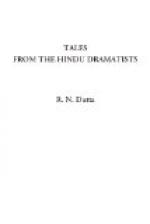PREFACE.
Many educationists think that our Indian boys should be encouraged to read the stories of the Ramayana and the Mahabharata, the two great Epics of India and Tales from the Sanskrit Dramatists when they are recommended to read “The Boy’s Odyssey,” “Legends of Greece and Rome,” “Arabian Nights’ Tales” and Lamb’s “Tales from Shakespeare.” It was perhaps from this view of the matter that the University of Calcutta recommended “The Boy’s Ramayana” and “Tales from the Hindu Dramatists” for the Matriculation Examination. As no books were published in time, the University had to issue an amended notice omitting the books from the list. To supply the want, I have ventured to write the “Boy’s Ramayana” and this humble book. I have tried my best to narrate briefly, in simple and idiomatic English, the stories on which the chief Sanskrit dramas are based. I hope that the University will be pleased to re-insert “The Boy’s Ramayana” and this book in the list of books recommended for the Matriculation Examination.
BALARAMADHAM, } 4, Madan Mitter’s Lane, } Rama Nath Dutt. Calcutta } 1911—December. }
TALES
FROM
The Hindu dramatists.
SAKUNTALA OR THE LOST RING.
In ancient days, there was a mighty king of the Lunar dynasty by name Dushyanta. He was the king of Hastinapur. He once goes out a-hunting and in the pursuit of a deer comes near the hermitage of the sage Kanwa, the chief of the hermits, where some anchorites request him not to kill the deer. The king feels thirsty and was seeking water when he saw certain maidens of the hermits watering the favourite plants. One of them, an exquisitely beautiful and bashful maiden, named Sakuntala, received him. She was the daughter of the celestial nymph Menaka by the celebrated sage Viswamitra and foster-child of the hermit Kanwa. She is smitten with love at the first sight of the king, standing confused at the change of her own feeling. The love at first sight which the king conceives for her is of too deep a nature to be momentary. Struck by her beauty he exclaims:—
“Her lip is ruddy as an opening bud; her graceful arms resemble tender shoots; attractive as the bloom upon the tree, the glow of youth is spread on all her limbs.”
Seizing an opportunity of addressing her, he soon feels that it is impossible for him to return to his capital. His limbs move forward, while his heart flies back, like a silken standard borne against the breeze. He seeks for opportunities for seeing her. With the thought about her haunting him by day and night, he finds no rest, and no pleasure even in his favourite recreation—sporting. Mathavya, the jester, friend and companion of the king, however, breaks the dull monotony of his anxious time. The opportunity which the king seeks offers itself. The hermits send an embassy to the king asking him to come over to the hermitage to guard their sacrifices. As he was making preparations for departure to the hermitage, Karavaka, a messenger from the queen-mother, arrives asking his presence at the city of Hastinapur.




